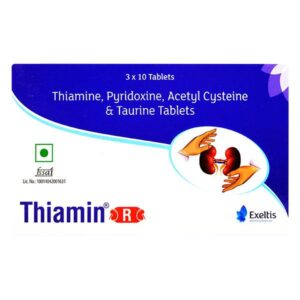THIAMINE HYDROCHLORIDE I.P + BENFOTIAMINE-PYRIDOXINE-MECOBALAMIN-INOSITOL
Thiamine Hydrochloride I.p: Thiamine Hydrochloride I.P., also known as Vitamin B1, is a synthetic form of thiamine, a water-soluble vitamin that plays a crucial role in the metabolism of carbohydrates, amino acids, and fats in the body. It is an essential nutrient that is necessary for various bodily functions.
Thiamine Hydrochloride is primarily used to treat and prevent thiamine deficiency, which can occur due to inadequate dietary intake, malabsorption disorders, alcoholism, liver disease, or certain medical conditions. Thiamine deficiency can lead to a condition known as beriberi, characterized by neurological symptoms such as muscle weakness, loss of coordination, and cognitive impairment.
The mechanism of action of Thiamine Hydrochloride involves acting as a coenzyme in several enzymatic reactions that are vital for the breakdown of glucose and the production of energy in the form of ATP. It is also involved in the synthesis of neurotransmitters like acetylcholine.
The typical dose of Thiamine Hydrochloride for adults is 5-30 mg per day, taken orally or administered intravenously. The dosage may vary depending on the individual’s age, condition, and specific requirements. It is usually recommended to take Thiamine Hydrochloride with food to enhance absorption.
Thiamine Hydrochloride is generally considered safe when taken within recommended doses. However, some individuals may experience side effects such as allergic reactions (rash, itching, swelling), nausea, stomach upset, headache, or diarrhea. If any severe side effects occur, it is important to seek medical attention immediately.
It is worth noting that Thiamine Hydrochloride I.P. is a prescription medication, and its use should be supervised by a healthcare professional. It is important to follow the instructions provided by the healthcare provider or label and not exceed the recommended dosage unless instructed to do so.
Benfotiamine-Pyridoxine-Mecobalamin-Inositol: Benfotiamine-Pyridoxine-Mecobalamin-Inositol is a combination drug used in the treatment of various neurological conditions, such as diabetic neuropathy, alcoholic neuropathy, and peripheral neuropathy. It contains four key ingredients:
1. Benfotiamine: It is a synthetic derivative of thiamine (vitamin B1) and acts as a precursor to thiamine. Benfotiamine helps to boost thiamine levels in the body, which is essential for nerve function and energy metabolism.
2. Pyridoxine: Also known as vitamin B6, pyridoxine is crucial for the formation of neurotransmitters and the maintenance of overall brain function. It aids in the synthesis of certain chemicals that regulate the nervous system.
3. Mecobalamin: This is a form of vitamin B12, which plays a vital role in the formation of red blood cells and the maintenance of nerve health. Mecobalamin helps in the regeneration and repair of damaged nerves.
4. Inositol: It is a naturally occurring substance found in the body and various foods. Inositol plays a role in cell signaling and the formation of neurotransmitters.
The mechanism of action for this combination drug is not fully understood. However, it is believed that the individual components work together to improve nerve function and reduce inflammation, leading to reduced neuropathic pain and improved nerve conduction.
The recommended dose of Benfotiamine-Pyridoxine-Mecobalamin-Inositol can vary depending on the specific condition being treated. It is typically taken orally, usually once daily or as directed by a healthcare professional.
Side effects of this drug are generally mild and infrequent. However, some individuals may experience gastrointestinal disturbances, such as nausea, diarrhea, or stomach discomfort. Allergic reactions are rare but possible. It is essential to consult a healthcare provider before starting this medication to ensure its safe use and to discuss any potential drug interactions or contraindications.

